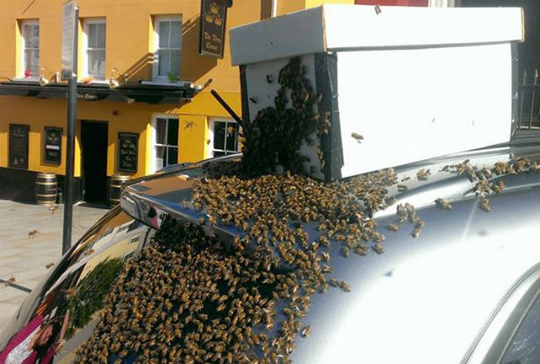London, May 26: In an incredible ordeal, a 65-year-old grandmother was followed by a huge swarm of bees for more than 24 hours while driving her car home from a nature reserve in the UK, attempting to rescue their queen.
Carol Howarth was amazed when a swarm of over 20,000 bees flew down onto her vehicle, covering the back end of the car.
The unusual incident happened shortly after she had parked her car in the town centre of Haverfordwest, West Wales, before going shopping at lunchtime last Sunday. A team of three beekeepers, a national park ranger and members of the public helped to capture and contain the swarm inside a cardboard box.
Howarth told the Telegraph that she had "never seen anything like it."
Pembrokeshire Coast National Park ranger Tom Moses raised the alarm when he spotted the swarm on the car.
Concerned that the insects might be destroyed with pesticide, Moses contacted two members of Pembrokeshire Beekeepers' Association, who came to help capture the swarm. "As I drove past I noticed this big brown splodge on the back of a car.
"I had seen swarms before settle on things like this but never one as large as this," Moses said.
After returning to her car, Howarth drove home believing the problem had been resolved, only to discover on Monday morning that the swarm had followed her and were again covering the car.
She was then forced to contact the beekeepers, who finally managed to remove the swarm for good.
"One theory was that the queen was trapped in my car and the swarm were following," Howarth said.
"But they couldn't find the queen anywhere so I've no idea if that was right. Apparently bees can swarm at this time of the year and it is a very strong instinct for them to follow the queen," she said.
"I still don't really understand why because they couldn't see the queen anywhere. Perhaps they just like the heat of my car," Howarth added.
Moses said members of colonies often follow their queen bee if she moves hives. And queens moves hives if the hives are disturbed — say, by humans. Or by the arrival of another queen bee.






Comments
Add new comment